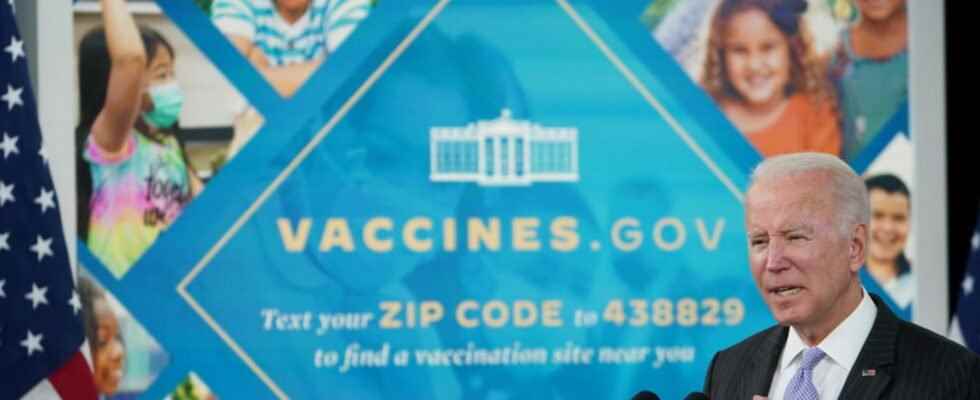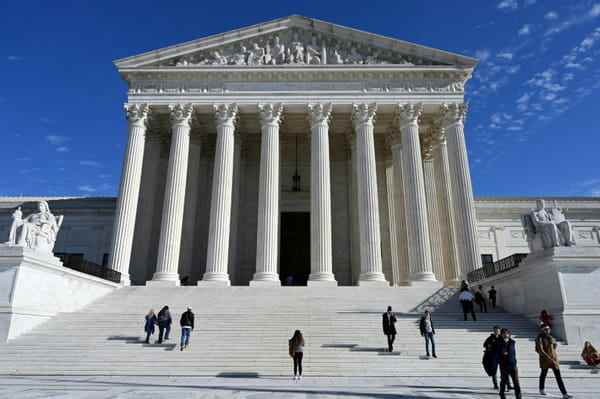The Supreme Court of the United States examines Friday urgently the obligation to be vaccinated against Covid-19 that Joe Biden wants to impose as quickly as possible on millions of recalcitrant employees.
After months of trying to convince the reluctant, the Democratic President announced in September that he wanted to make vaccination compulsory, especially in companies with more than 100 employees.
In the country of individual freedoms, this measure was immediately denounced by elected Republican officials, who see it as an abuse of power on the part of the federal state, and by a part of the economic world which considers it counterproductive.
The implementing decrees, published in early November, set at the beginning of January the deadline for employees to receive their first dose or otherwise agree to undergo a weekly screening, under penalty of a fine for their employers.
Several republican states, as well as employers’ organizations, had then multiplied the legal remedies, which led to contradictory decisions, and postponed the application of the measure.
Asked to rule, the Supreme Court agreed on December 22 to devote an exceptional hearing to this question with heavy health and political issues.
Its nine wise men will therefore study two distinct obligations: the first concerns private companies with more than 100 employees, which represent two thirds of employees in the private sector, ie 80 million people; the other concerns employees of health structures which benefit from federal subsidies.
– “Save lives” –
In an argument sent upstream of the hearing, the Democratic administration justifies the measure in the name of the health emergency facing the “deadliest pandemic in the history of the country” and stresses that the workplaces represent major sources of contamination.
The vaccination obligation “will save 6,500 lives and prevent 250,000 hospitalizations over the next six months,” said State representative before the Court, Elizabeth Prelogar.
But for 26 employers’ associations, the rule “will impose irreparable harm on thousands of companies” which will either have to finance the costs of tests of reluctant employees, or face “massive departures” of their workforce.
Republican states, led by Missouri, advance the same argument to denounce the obligation of vaccination in medical environment which, according to them, “threatens to create a crisis in rural America” since “millions of employees will have to choose between losing their employment or comply with an illegal federal obligation “.
The government retorts that, in the sectors that have already imposed the vaccine, departures were ultimately very low. He cites the example of a hospital in Houston, Texas, where only 153 out of 26,000 employees resigned so as not to have to comply with an obligation of vaccination.
Several large American groups, including the meat giant Tyson Foods or the airline United Airlines, also imposed these obligations on their employees at the end of September without major concern.
– 62% vaccinated –
The Supreme Court, which has six conservative magistrates out of nine, has so far validated the vaccine obligations imposed in academia or by local authorities.
But its judges have already limited the interventions of the federal state linked to the pandemic, in particular by invalidating a moratorium on rental evictions.
Their decision should be rendered within a few weeks.
If the High Court blocked the administration’s measure, it would represent a considerable setback for Joe Biden who has made the fight against the pandemic one of his priorities but is facing an outbreak of contaminations under the effect of the Omicron variant.
The United States, where only 62% of the population is fully vaccinated due to very marked political divisions on the issue, has so far recorded more than 58 million cases and 833,000 deaths.
All rights of reproduction and representation reserved. © (2022) Agence France-Presse

